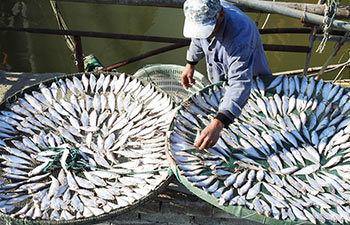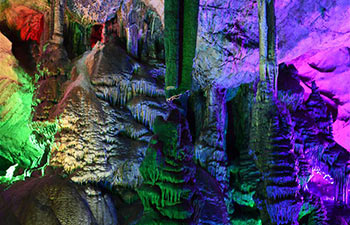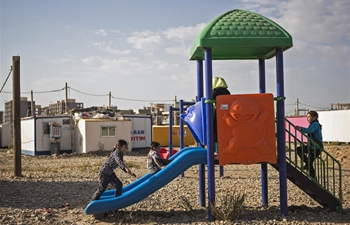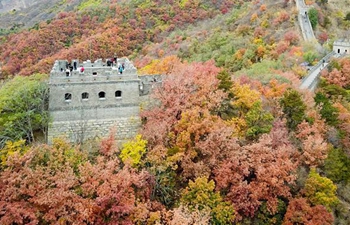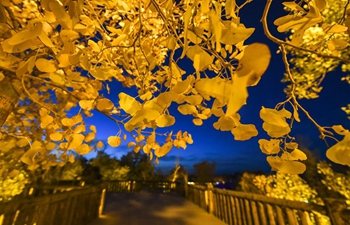TOKYO, Oct. 31 (Xinhua) -- Police in Tokyo's popular Shibuya shopping district are bracing for another raucous Halloween street party on Wednesday night with the build-up to the main event on previous nights leading to a number of arrests for indecent and antisocial behavior.
The famous scramble crossing and its surrounding streets, known for drawing throngs of youngsters, are the center of Japan's Halloween celebrations, which have grown steadily over the years.
Each year, thousands of revelers congregate on the streets to show off their ghoulish costumes, pose for photos, drink, and flirt.
It is also a popular attraction for tourists, with thousands arriving in costume or simply to spectate, wandering with smartphones and cameras.
When Halloween falls on a weeknight, as it does this year, crowds also assemble on the preceding weekend. This year was no exception.
However, the event has become notorious for rowdy behavior, and on Saturday, police arrested five people on charges of groping, camera voyeurism, and damage to property.
Though there were fewer incidents on Sunday, a vehicle was overturned and two revelers climbed on top of it. Its occupants escaped unharmed.
The area was left covered in garbage including discarded costumes, cans, and broken glass. Police also received complaints from shops and restaurants saying revelers had blocked their entrances, preventing customers from coming and going.
Last year, a small number of people were arrested in Shibuya on groping charges. Police stressed that the number was tiny relative to the size of the crowds.
In response, police have this year boosted their numbers for the Halloween week. The officers, nicknamed DJ Police, monitor the crowds from raised platforms armed with megaphones and scrolling signs, telling revelers to have fun and be careful.
In an effort to reduce unruly behavior, they have asked major stores around the scramble crossing to cease alcohol sales, though broken glass from beer bottles indicates that revelers are bringing their alcohol from elsewhere.
This week, Ken Hasebe became the first Shibuya mayor to hold a press conference about the ward's Halloween festivities.
He condemned the weekend's arrests and the overturning of the vehicle as "absolutely intolerable," and called for an effort to make sure partygoers make it home safely, do not miss the last trains, and keep disruption to minimum.
However, he stressed that he was certain the celebration could be carried out in good will, and wanted to avoid regulation if possible.
"Halloween is beginning to take root in the culture of Shibuya. I want to foster it," Hasebe said.
According to the Shibuya Ward Office, 7.8 tons of garbage was collected in Shibuya after the celebrations last year. Public bathrooms, used by revelers to change into their costumes, were also left in poor condition, covered in makeup and fake blood.
The cleanup operation is assisted by volunteers, who, for the last three years, were given gloves, tongs and special jack-o-lantern garbage bags to collect litter with.
Previous years have seen campaign tie-ins from pop icons such as Ayumi Hamasaki urging revelers to pick up their garbage.
This year, in addition to additional temporary garbage cans, the Shibuya ward is installing donation boxes where people can deposit unwanted props and costumes. The donations will be sold online, with proceeds going to the cleanup operation.
Halloween is not traditionally a Japanese custom. Its origins in the country can be traced back to the 1950s, when a bookstore in Harajuku, the fashion-forward district neighboring Shibuya, started selling imported books and magazines.
By the 1970s, the shop's foreign customers were asking how to get hold of Halloween goods. Staff visited the United States to learn about Halloween culture, and in the 1980s began hosting children's Halloween parties.
The event grew each year, with hundreds of children participating, and other shops followed suit.
The festival received a major boost in 1997, when Disneyland Tokyo introduced Halloween costumes and decorations to its parades.
Tokyo's bars and clubs began hosting Halloween parties, which have in the last decade gradually moved to the streets, particularly in Shibuya, which has developed a reputation for street festivities following the 2002 FIFA World Cup.
In recent years, the Halloween celebrations in Shibuya have become some of the largest in the world.
Other major Tokyo Halloween events are held in locations including Ikebukuro, Kawasaki, and Roppongi.
While Halloween is still not widely celebrated outside major cities in Japan, even small towns have Halloween-themed parties in bars and Halloween-branded candy and toys are sold in supermarkets across the country. Trick or treating, however, remains rare.
